Noted Holocaust scholar Michael Berenbaum believes that “theater transformed our understanding of the Holocaust.”
In a video on the website of the new Holocaust Theater Catalog (HTC) – based at the University of Miami’s Sue and Leonard Miller Center for Contemporary Judaic Studies and the College of Arts & Sciences George Feldenkreis Program in Judaic Studies – Berenbaum says: “The goal of the theater is to re-humanize (the victims) – to give them a name, a voice, a narrative, a story. If the goal of the Nazis was to dehumanize, theater is the counter testimony, the counter weight.”
The HTC is a comprehensive online database of theater works relating to the Holocaust written from 1933 to the present. It was created and is maintained by the National Jewish Theater Foundation (NJTF), funded by a major program grant from the John S. and James L. Knight Foundation (along with private donors).
At the October 7 launch event, NJTF President and Producing Artistic Director Arnold Mittelman said the catalog will allow users to select a play and “create it, observe it, react to it, learn about it, and write about it – a multimedia experience they will never forget.”
He demonstrated the site, which provides the title, author, format, cast size, original language, production rights holder, and experiences chronicled (such as hiding, survivors and subsequent generations, and women and the Holocaust) for more than 580 plays.
 |
| A scene from filmed play "The Soap Myth," which is included in the Holocaust Theater Catalog (HTC). The HTC recently found its permanent home at the University of Miami. |
The HTC was gifted to the UM Miller Center and the College of Arts & Science Feldenkreis Program in Judaic Studies. Director Dr. Haim Shaked said the user-friendly and informative website is the result of many years of hard work to “develop this precious collection in a digital form, and make it available to the public.”
The launch featured a screening of “The Soap Myth,” a contemporary filmed play included in the catalog. Written by Jeff Cohen, it tells the story of a young Jewish journalist implored by a Holocaust survivor to report his story about claims that the Nazis manufactured soap from the fat of Jewish corpses. She becomes entangled in the politics of Holocaust scholarship, survivor memory and Holocaust denial.
Dr. Eugene Rothman, associate director for academic development and senior fellow at the Miller Center and faculty in the Judaic Studies program, manages the Holocaust Survivors Support Internship Program. This unique learning opportunity pairs students with Holocaust survivors living in South Florida. The partners meet bi-weekly for two semesters, and then work together to create legacy projects sharing the survivors’ experiences.
“Time is marching on and soon survivors will no longer be available,” Rothman said, calling them “the heart of effective Holocaust education.”
“Theater may create a sense of living history, giving students a sense of having been there and an emotional effect that cannot be given through written words,” he added.
In another video on the HTC site, Holocaust survivor Irving Roth talks about seeing a student production of a play based on his memoir, Bondi’s Brother. “That night, that March evening in 2012, my brother was alive in that auditorium. The objective of the Nazi regime was to totally and completely eliminate the Jews, as if they never existed – and yet, 67 years later, there was a conversation – young people, talking about my brother.”
The Holocaust Theater Catalog is available at htc.miami.edu.
October 09, 2014

